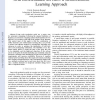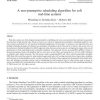188 search results - page 33 / 38 » Regret Minimization and Job Scheduling |
CCGRID
2008
IEEE
14 years 2 months ago
2008
IEEE
—Large scale production grids are a major case for autonomic computing. Following the classical definition of Kephart, an autonomic computing system should optimize its own beha...
CLUSTER
2004
IEEE
13 years 11 months ago
2004
IEEE
Gang Scheduling and related techniques are widely believed to be necessary for efficientjob scheduling on distributed memory parallel computers. This is hecause they minimize cont...
ECCC
2000
13 years 7 months ago
2000
We consider the problem of Scheduling n Independent Jobs on m Unrelated Parallel Machines, when the number of machines m is xed. We address the standard problem of minimizing the ...
ICS
2005
Tsinghua U.
14 years 1 months ago
2005
Tsinghua U.
Traditionally, scheduling in high-end parallel systems focuses on how to minimize the average job waiting time and on how to maximize the overall system utilization. Despite the d...
CEE
2007
13 years 7 months ago
2007
Real-time systems are often designed using preemptive scheduling and worst-case execution time estimates to guarantee the execution of high priority tasks. There is, however, an i...


